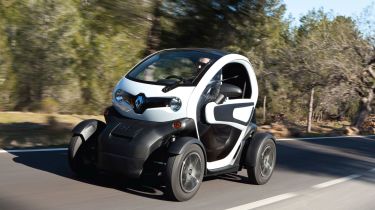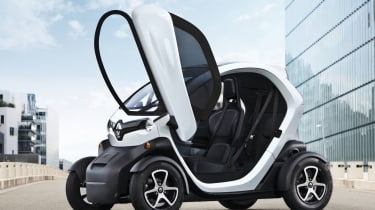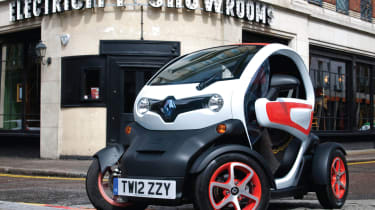Renault Twizy (2012-2021) review
An eye-catching urban runabout with an extrovert nature, the Renault Twizy makes for fun and environmentally friendly city transport
Pros
- Charging costs £1 a day
- Nippy urban runabout
- Fun for extroverts
Cons
- Severely limited practicality
- Poor ride and refinement
- Exposed to weather
| Car type | Range | Domestic socket charge time | Rapid charge time |
|---|---|---|---|
| Electric | 62 miles | 4hrs (0-100%, 3kW) | N/a |
It's not often you associate the term 'quadricycle' with electric cars, but it's a government classification for a type of small vehicle such as the Renault Twizy. To fit the class, the model must weigh less than 450kg, with tightly limited power and performance.
The Citroen Ami is the Twizy's only direct rival, and while the tiny Renault is more stable and weather-proof than an e-scooter, it demands a lot of compromises compared with an electric supermini like the MINI Electric, or Renault ZOE. For this reason, we can see the Twizy being a second (or even third) car for owners to take on local trips in nice weather, and it could appeal to buyers living in congested cities, tourist spots or even on small islands.
In reality, the Twizy's funky design and low price are just as likely to attract buyers as its eco credentials. With a metal frame, plastic body panels and outboard wheels at each corner, there's nothing else quite like it on the road, and it attracts as much attention as supercars costing 20 times the price. Even the tandem seating for the driver and one passenger is unconventional. A small 20bhp motor drives the rear wheels with a single-speed transmission, and there's a tiny 6.1kWh battery under the driver’s seat. Open the bonnet and you'll find the charging cable.
The Twizy is easy to operate; the controls are identical to a car with an automatic gearbox, with a steering wheel and two pedals. The handbrake sits under the steering wheel. Weather protection is provided by a heated windscreen with a single wiper, plus optional doors and side screens. It's a rudimentary set-up, and don't think by going for the doors that you'll stay dry – they won't protect you from the rain during a downpour. There’s no heater, or anything else in the way of creature comforts.
The Twizy’s official range is quoted at 62 miles, but 50 seems a more realistic number for most drivers – especially when you take into account the UK's generally inclement weather. Due to the battery's small size, it can be charged in around three-and-a-half hours from empty using any standard domestic electricity socket. In fact, the Twizy’s on-board charger will only draw 10A from any socket, so although you can buy an aftermarket Type 2 adapter, it won’t save you any time at a public charging point. There’s no point installing a wallbox at home, either (unless, of course, you have a 'normal' electric car as well).
There’s only one Twizy bodystyle available, but there are two key variants. The standard model with its two seats is of most interest to private users, but businesses with urban delivery rounds might consider the Twizy Cargo. It looks the same from the outside, but has a 180-litre luggage box where the rear passenger would otherwise sit. The standard passenger version is available in two different trim levels. The entry-level model is called the Expression and has plastic wheel trims, while the Dynamique has alloy wheels and more funky colour combinations to choose from – which isn't a lot for the extra £700 or so asked.
On the road, the Twizy is a mixed bag. It’s nimble and grippy and has a decent enough turn of speed to keep up with urban traffic. It’s also undeniably fun, at least to start with, thanks to its direct steering. The fact you're so exposed means the Twizy is about as close as you can get to an electric go-kart for the road. Whether that fun wears off after a while depends on your commitment to the concept, but the Twizy has a pretty bumpy and uncomfortable ride, and the exposure to wind and traffic noise can become tiring after a while. Some might suggest the Twizy is better suited to warmer climes.
As for practicality, that depends where you’re coming from. Scooter riders will love the (relatively) cosy cabin, but resent the fact that the wider track means they can't filter through traffic as they might on a bike. City-car drivers will feel initially exposed and their passengers potentially affronted by the legs-akimbo posture demanded by the tandem rear seat. Luggage space is severely limited, but there’s a bit more space overall than in a scooter top-box, and you can always strap a bag to the back seat.
Is the Twizy a good-value electric vehicle, then? Maybe as a used buy, but now that Renault has removed the battery lease option and hiked up the list price, it looks like little more than an expensive quirk. Still, if you can fit a Twizy into your lifestyle and put up with the practical compromises, it should put a smile on your face every time you drive it. For a more detailed look at the Renault Twizy, read on for the rest of our in-depth review...






